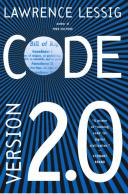Книга: Code 2.0
Chapter 13. Interlude
Chapter 13. Interlude
Let’s pause for a moment and look back over these three chapters. There is a pattern to the problems they present — a way of understanding how all three problems are the same.
In one sense, each has asked: How much control should we allow over information, and by whom should this control be exercised? There is a battle between code that protects intellectual property and fair use; there is a battle between code that might make a market for privacy and the right to report facts about individuals regardless of that market; there is a battle between code that enables perfect filtering of speech and architectures that ensure some messiness about who gets what. Each case calls for a balance of control.
My vote in each context may seem to vary. With respect to intellectual property, I argue against code that tracks reading and in favor of code that guarantees a large space for an intellectual commons. In the context of privacy, I argue in favor of code that enables individual choice — both to encrypt and to express preferences about what personal data is collected by others. Code would enable that choice; law could inspire that code. In the context of free speech, however, I argue against code that would perfectly filter speech — it is too dangerous, I claim, to allow perfect choice there. Better choice, of course, is better, so code that would empower better systems of reputation is good, as is code that would widen the legitimate range of broadcasting.
The aim in all three contexts is to work against centralized structures of choice. In the context of filtering, however, the aim is to work against structures that are too individualized as well.
You may ask whether these choices are consistent. I think they are, but it’s not important that you agree. You may believe that a different balance makes sense — more control for intellectual property or filtering perhaps, and less for privacy. My real interest is in conveying the necessity of such balancing and of the values implicit in the claim that we will always require a balance. Always there is a competition between the public and private; always the rights of the private must be balanced against the interests of the public. Always a choice must be made about how far each side will be allowed to reach. These questions are inherent to public law: How will a particular constellation of constitutional values be reckoned? How will a balance be struck in particular factual contexts?
I have argued this point while neglecting to specify who is responsible for any given imbalance. There are those who would say that there is too much filtering, or not enough privacy, or too much control over intellectual property, but these are not public concerns unless the government is responsible for these imbalances. Constitutional value in the United States extends only so far as state action extends. And I have not shown just how state action extends to these contexts.
I do not intend to. In my view, our tradition reveals at least an ambiguity about how far constitutional values are to extend. In a world where only governments are regulators, keeping the Constitution’s authority limited to state action makes some sense. But when the modalities of regulation are multiplied, there is no reason to ignore the reach of constitutional values. Our framers made no choice about this; there is no reason why regulation through code cannot be informed by constitutional values. No argument has been made for why this part of our life should be cut off from the limitations and protections traditionally provided by the Constitution.
Code strikes the balance between individual and collective rights that I have highlighted so far. In the next chapter, a different balance is struck — one again made salient by code. However, this time the balance is not between the state and the individual but between the state and the implicit regulations of the architectures of cyberspace. Now the threat is to a traditional sovereignty. How do we translate that tradition to fit a world where code is law?
- Chapter 5. Preparations
- Chapter 6. Traversing of tables and chains
- Chapter 7. The state machine
- Chapter 8. Saving and restoring large rule-sets
- Chapter 9. How a rule is built
- Chapter 10. Iptables matches
- Chapter 11. Iptables targets and jumps
- Chapter 12. Debugging your scripts
- Chapter 5 Installing and Configuring VirtualCenter 2.0
- Chapter 13. rc.firewall file
- Chapter 14. Example scripts
- Chapter 15. Graphical User Interfaces for Iptables




